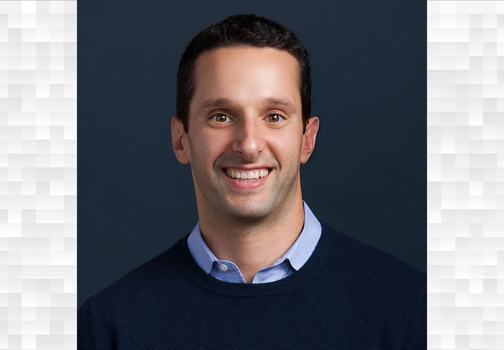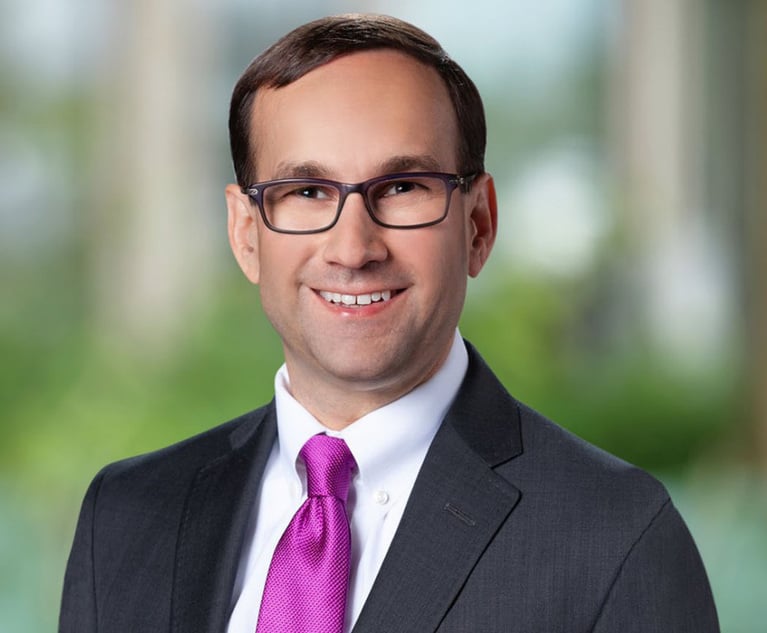InCloudCounsel's Ben Levi on Creating a Gig Economy for Lawyers
COO Ben Levi co-founded InCloudCounsel several years ago with two business partners. The company allows lawyers to work as contractors without the stress of billing for a large law firm. Here he talks about the growing gig economy for lawyers.
October 26, 2018 at 02:18 PM
5 minute read
 Ben Levi, co-founder and COO of InCloudCounsel. Courtesy photo
Ben Levi, co-founder and COO of InCloudCounsel. Courtesy photo
Services such as Uber and Lyft have given people the opportunity to work when they want to, and for as long as they wish. That got Ben Levi thinking that he could find attorneys who did not want to live the lifestyle that comes with large-firm employment to do tasks that are often expensive and repetitive for corporations, and on behalf of other firms.
After meeting with his co-founders, Troy Pospisil and Lane Lillquist, and bringing the legal, business and technology together, Levi formed InCloudCounsel several years ago. The company allows lawyers to work as contractors and to do quality work for clients without the stress of billing for a large law firm, an increasingly popular virtual and freelance legal business model that includes competitors such as UpCounsel.
Corporate Counsel spoke with Levi, co-founder and chief operating officer, on Thursday about his past, the start of InCloudCounsel and the future of alternative legal services. Here are excerpts from that conversation, edited for brevity and clarity.
Corporate Counsel: What were you doing before the creation of InCloudCounsel?
Ben Levi: I went to Harvard for law school, and then right after Harvard I joined Kirkland & Ellis. I was there for almost five years and I loved the people. The people were the best part of being at Kirkland. They are all super-smart and super-driven and were also, generally speaking, really friendly and willing to help out. Ultimately, it wasn't compatible with my desires for my own life.
How did InCloudCounsel come about?
I came at it from the legal and law firm side. Troy, who is my co-founder and CEO, came at it from the business side and then Lane, who is our third co-founder and CTO, came at it from the tech side. We all had different perspectives on how to solve similar problems. I was connected to Troy through a mutual connection, and Troy and Lane knew each other from being out in San Francisco.
I actually came at it from a “let's talk about attorneys perspective.” Big law firms generally weren't really compatible with me and what I wanted for my life. I looked around and realized that I wasn't alone. There are a bunch of people who loved it and that got them jazzed. I was really jealous of them. I didn't see other great options to keep practicing law at a high level like we were at Kirkland. My feeling was that we should use the internet to find another path to find people for whom this big law lifestyle wasn't a compatible career choice.
I then met with Troy and he was at a private equity company and he was doing a bunch of non-disclosure agreements (NDAs) himself. While doing them he had two options: He could send that money to a large law firm and pay way too much money for it, or he could, as a nonlawyer, do it himself and it wasn't going to be a high level of quality. He said there should be another way here.
Were you met with skepticism when pitching this to law firms and clients?
I think we had expected far more resistance to our model than we got. The really good law firms realized those repetitive contracts weren't where their work should be getting done.
On the client side, I think we were lucky as much as anything to be doing it when we were doing it. We came about it at a time when that person, who we were in a meeting with, had probably taken Uber to work and had probably ordered dinner online and had their documents in the cloud. They had been accustomed to the notion that traditional services could be delivered in nontraditional ways and the outcome could be better. So we didn't have to do that bit of education. All we had to do was say, 'Here's our solution to a problem we know you have and here's how we do it.' They understood that there could be a better way.
Do you think in the coming years that the alternative legal service industry is going to continue to grow?
What I think maybe even more than that, is that there will be compartmentalization. Like, here is who you should go to for this type of work rather than going to one law firm for everything from simple documents to intellectual property work. I think there will be a realization that there will be better ways to do things at certain places.
There is also no shame in saying I don't want to work at Kirkland or a large law firm. For some people this is great. If alternative legal services is done correctly, it should allow those working at large law firms to enjoy their lives more and continue to practice at a really high level.
This content has been archived. It is available through our partners, LexisNexis® and Bloomberg Law.
To view this content, please continue to their sites.
Not a Lexis Subscriber?
Subscribe Now
Not a Bloomberg Law Subscriber?
Subscribe Now
NOT FOR REPRINT
© 2025 ALM Global, LLC, All Rights Reserved. Request academic re-use from www.copyright.com. All other uses, submit a request to [email protected]. For more information visit Asset & Logo Licensing.
You Might Like
View All
People and Purpose: AbbVie's GC on Leading With Impact and Inspiring Change
7 minute read
From Olympic Aspirations to Legal Innovation: Tom Dunlop's Journey to Founding Summize
8 minute read
'Am I Spending Time in the Right Place?' SPX Technologies CLO Cherée Johnson on Living and Leading With Intent
9 minute read
Mary O'Carroll on Her Move to Goodwin: Law Firms Are at the Heart of Industry Disruption
Trending Stories
Who Got The Work
Michael G. Bongiorno, Andrew Scott Dulberg and Elizabeth E. Driscoll from Wilmer Cutler Pickering Hale and Dorr have stepped in to represent Symbotic Inc., an A.I.-enabled technology platform that focuses on increasing supply chain efficiency, and other defendants in a pending shareholder derivative lawsuit. The case, filed Oct. 2 in Massachusetts District Court by the Brown Law Firm on behalf of Stephen Austen, accuses certain officers and directors of misleading investors in regard to Symbotic's potential for margin growth by failing to disclose that the company was not equipped to timely deploy its systems or manage expenses through project delays. The case, assigned to U.S. District Judge Nathaniel M. Gorton, is 1:24-cv-12522, Austen v. Cohen et al.
Who Got The Work
Edmund Polubinski and Marie Killmond of Davis Polk & Wardwell have entered appearances for data platform software development company MongoDB and other defendants in a pending shareholder derivative lawsuit. The action, filed Oct. 7 in New York Southern District Court by the Brown Law Firm, accuses the company's directors and/or officers of falsely expressing confidence in the company’s restructuring of its sales incentive plan and downplaying the severity of decreases in its upfront commitments. The case is 1:24-cv-07594, Roy v. Ittycheria et al.
Who Got The Work
Amy O. Bruchs and Kurt F. Ellison of Michael Best & Friedrich have entered appearances for Epic Systems Corp. in a pending employment discrimination lawsuit. The suit was filed Sept. 7 in Wisconsin Western District Court by Levine Eisberner LLC and Siri & Glimstad on behalf of a project manager who claims that he was wrongfully terminated after applying for a religious exemption to the defendant's COVID-19 vaccine mandate. The case, assigned to U.S. Magistrate Judge Anita Marie Boor, is 3:24-cv-00630, Secker, Nathan v. Epic Systems Corporation.
Who Got The Work
David X. Sullivan, Thomas J. Finn and Gregory A. Hall from McCarter & English have entered appearances for Sunrun Installation Services in a pending civil rights lawsuit. The complaint was filed Sept. 4 in Connecticut District Court by attorney Robert M. Berke on behalf of former employee George Edward Steins, who was arrested and charged with employing an unregistered home improvement salesperson. The complaint alleges that had Sunrun informed the Connecticut Department of Consumer Protection that the plaintiff's employment had ended in 2017 and that he no longer held Sunrun's home improvement contractor license, he would not have been hit with charges, which were dismissed in May 2024. The case, assigned to U.S. District Judge Jeffrey A. Meyer, is 3:24-cv-01423, Steins v. Sunrun, Inc. et al.
Who Got The Work
Greenberg Traurig shareholder Joshua L. Raskin has entered an appearance for boohoo.com UK Ltd. in a pending patent infringement lawsuit. The suit, filed Sept. 3 in Texas Eastern District Court by Rozier Hardt McDonough on behalf of Alto Dynamics, asserts five patents related to an online shopping platform. The case, assigned to U.S. District Judge Rodney Gilstrap, is 2:24-cv-00719, Alto Dynamics, LLC v. boohoo.com UK Limited.
Featured Firms
Law Offices of Gary Martin Hays & Associates, P.C.
(470) 294-1674
Law Offices of Mark E. Salomone
(857) 444-6468
Smith & Hassler
(713) 739-1250






